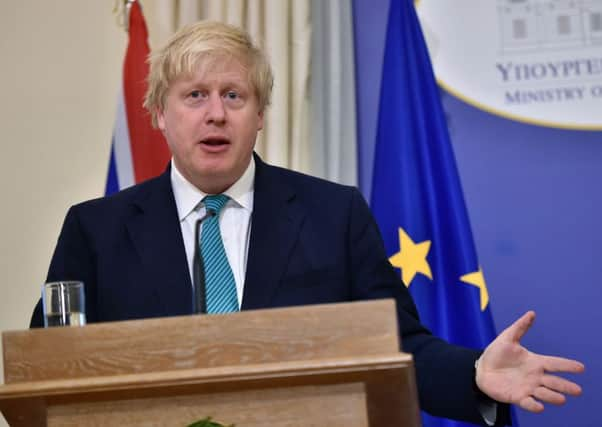Leader comment: Boris Johnson right to cancel Russian talks


Rather than travelling to Moscow to meet Russian counterpart Sergei Lavrov, he will now be travelling to Italy for a G7 meeting, where he will call for Russian President Vladimir Putin to pull his troops from Syria.
His Russian visit would have been the first by a United Kingdom Foreign Secretary in five years and was cancelled after discussions with the US, which is sending Secretary of State Rex Tillerson to Moscow to deliver a “clear and co-ordinated” message to the Kremlin. It has inevitably opened Mr Johnson to the charge that he has ceded our diplomatic position to the US and left the UK with little by way of a credible independent voice of its own.
Advertisement
Hide AdAdvertisement
Hide AdMoscow has predictably seized on this point, saying his decision casts doubt on the value of speaking to the UK “which does not have its own position on the majority of present-day issues, nor does it have real influence on the course of international affairs, as it remains ‘in the shadow’ of its strategic partners.”
The SNP’s foreign affairs spokesman Alex Salmond joined in with the criticism of the Foreign Secretary, saying that it “makes him look like some kind of ‘mini-me’ to the USA and that’s not a position that any foreign secretary would want to be in.”
That may well be how it looks – together with the implication that the UK position at present on Russian and Syria differs little from that of the US. But that is to miss the greater issue at stake here: the Assad regime did indeed cross a line on a bombing mission which resulted in the use of chemical weapons against civilians and children in particular.
It is surely now up to President Putin who has defended the Assad regime to distance himself from an action that has outraged the world and to bring pressure to bear to ensure that there is no repetition of this appalling crime.
Indeed, until there is some clear indication from Moscow that it is open to movement on this point, the most appropriate response from the UK would be to leave in no doubt Russia’s isolation from normal diplomatic exchanges. These proceed on the basis of a shared commitment to respect for international law and UN-approved protocols that govern behaviour in armed conflict.
The ball is now firmly in Moscow’s court. And now is the time to press home the point that those who have backed the Syrian regime and extended Assad’s grip on power cannot be expected to enjoy normal diplomatic courtesies. The Foreign Secretary’s decision to lend UK support to a joint G7 call for a response is likely to carry more clout than the UK pleading on its own. Indeed, it is just the sort of co-ordinated international response that Labour, the SNP and the Liberal Democrats would normally be urging in this situation.